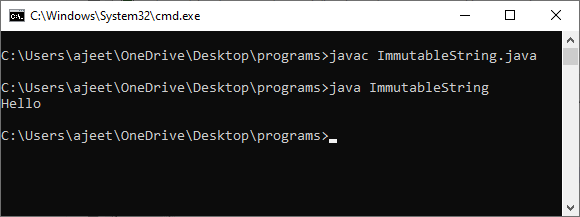Why Are Strings Immutable in Java? Comprehensive Evaluation for Designers
Why Are Strings Immutable in Java? Comprehensive Evaluation for Designers
Blog Article
What Is Unalterable Strings and Just How It Works
In the world of programs, comprehending the concept of immutable strings is extremely important for creating protected and robust applications. Unalterable strings refer to strings that can not be changed after they are produced, making sure information stability and predictability within the code.
The Fundamentals of Unalterable Strings
Immutable strings, as an essential concept in programs, are personality sequences that can not be transformed when they are produced. This means that as soon as a string is designated a worth, that worth can not be altered. In languages like Python and Java, strings are immutable things, leading to various implications in regards to memory administration and information honesty.
One of the essential benefits of immutable strings is that they give a complacency in information manipulation. Because the content of an immutable string can not be changed, it guarantees that the initial data stays intact, minimizing the threat of unintended modifications throughout program execution (Why are strings immutable in Java?). This building additionally streamlines debugging procedures, as programmers can trust that when a string is defined, its worth will certainly not be unintentionally altered
When a brand-new string is created based on an existing one, instead than customizing the initial string, the brand-new value is saved individually. Overall, comprehending the basics of unalterable strings is important for understanding programs principles and enhancing code performance.
Benefits of Unalterable Strings
Building upon the security and effectiveness benefits of unalterable strings, their advantages include enhancing code integrity and simplifying simultaneous programming tasks. By being unalterable, strings can not be customized after creation, which eliminates the threat of unexpected modifications in the information they keep. This inherent immutability ensures that as soon as a string is produced, its worth remains consistent throughout the program's execution, minimizing the opportunities of insects triggered by unexpected changes.
In addition, immutable strings add to code integrity by making it less complicated to reason about the state of a program. Given that strings can not be altered, programmers can trust that a string will always hold the same worth, streamlining debugging and upkeep efforts. This predictability causes extra trustworthy and steady codebases.

Application in Programs Languages
Within numerous programming languages, the consolidation of immutable strings is a fundamental element that influences just how information is dealt with and adjusted within code frameworks. The implementation of unalterable strings differs throughout different programs languages, with each language using its own devices to sustain this idea.

On the other hand, languages like C and C++ do not have built-in support for unalterable strings. Designers in these languages must by hand carry out immutability by imposing regulations within their code to stop direct modifications to string things.
Ideal Practices for Collaborating With Unalterable Strings
When dealing with unalterable strings in programming languages like Java and Python, adhering to finest methods guarantees reliable and protected data manipulation. basics One of the key finest methods is to make use of StringBuilder or StringBuffer instead of directly adjusting strings, especially when handling substantial concatenation operations. These courses supply mutable choices for string manipulation, aiding to stay clear of unnecessary memory allowances and enhancing efficiency.
Furthermore, when working with delicate data such as passwords or API tricks, it is important to avoid storing them as simple text in unalterable strings. Utilizing protected storage mechanisms like char arrays or specialized libraries for managing delicate information aids alleviate protection threats linked with immutable strings.
Real-world Applications and Instances
Exploring practical executions of immutable strings in numerous markets exposes their considerable influence on information honesty and system dependability. In the medical care field, unalterable strings play an important duty in ensuring the safety and discretion of individual information. By protecting against unapproved modifications to sensitive information such as clinical records and prescriptions, immutable strings assist keep conformity with rigorous privacy laws like HIPAA.
Banks additionally gain from the unalterable nature of strings to boost the safety of client data and transaction documents. Immutable strings assist stop scams and unauthorized alterations to monetary info, giving a robust protection against cyber hazards and making sure the trust and self-confidence of clients.

Conclusion
Finest practices for functioning with immutable strings include preventing straight alterations and making use of techniques that return brand-new string items. Real-world applications of unalterable strings include information encryption, caching, and string control jobs.
Immutable strings refer to strings that can not be changed after they are created, making sure data stability and predictability within the code. When a brand-new string is developed based on an existing one, rather helpful site than modifying the original string, original site the brand-new value is saved independently.In languages like Java and Python, strings are immutable by default, indicating that once a string object is produced, its worth can not be altered - Why are strings immutable in Java?. Ideal practices for functioning with immutable strings include staying clear of straight modifications and utilizing methods that return brand-new string items. Real-world applications of immutable strings include information encryption, caching, and string manipulation jobs
Report this page